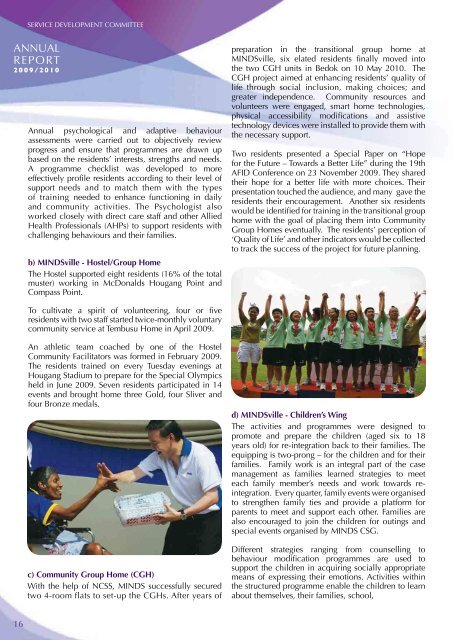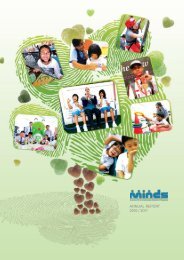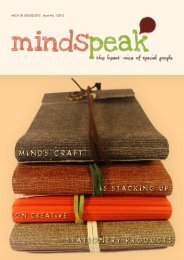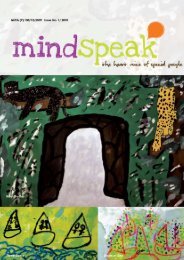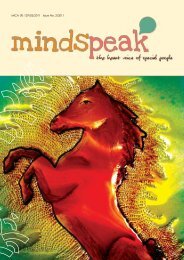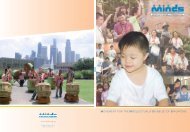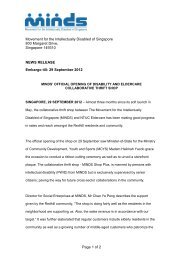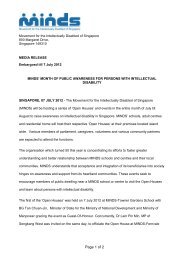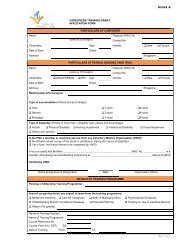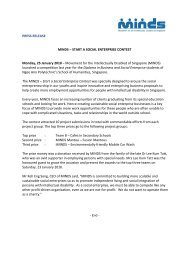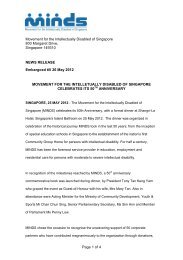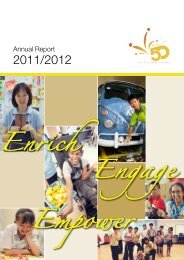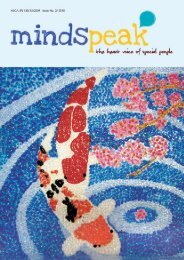2009/2010 - MINDS
2009/2010 - MINDS
2009/2010 - MINDS
You also want an ePaper? Increase the reach of your titles
YUMPU automatically turns print PDFs into web optimized ePapers that Google loves.
SERVICE DEVELOPMENT COMMITTEE<br />
ANNUAL<br />
REPORT<br />
2 0 0 9 / 2 0 1 0<br />
Annual psychological and adaptive behaviour<br />
assessments were carried out to objectively review<br />
progress and ensure that programmes are drawn up<br />
based on the residents’ interests, strengths and needs.<br />
A programme checklist was developed to more<br />
effectively profile residents according to their level of<br />
support needs and to match them with the types<br />
of training needed to enhance functioning in daily<br />
and community activities. The Psychologist also<br />
worked closely with direct care staff and other Allied<br />
Health Professionals (AHPs) to support residents with<br />
challenging behaviours and their families.<br />
b) <strong>MINDS</strong>ville - Hostel/Group Home<br />
The Hostel supported eight residents (16% of the total<br />
muster) working in McDonalds Hougang Point and<br />
Compass Point.<br />
preparation in the transitional group home at<br />
<strong>MINDS</strong>ville, six elated residents finally moved into<br />
the two CGH units in Bedok on 10 May <strong>2010</strong>. The<br />
CGH project aimed at enhancing residents’ quality of<br />
life through social inclusion, making choices; and<br />
greater independence. Community resources and<br />
volunteers were engaged, smart home technologies,<br />
physical accessibility modifications and assistive<br />
technology devices were installed to provide them with<br />
the necessary support.<br />
Two residents presented a Special Paper on “Hope<br />
for the Future – Towards a Better Life” during the 19th<br />
AFID Conference on 23 November <strong>2009</strong>. They shared<br />
their hope for a better life with more choices. Their<br />
presentation touched the audience, and many gave the<br />
residents their encouragement. Another six residents<br />
would be identified for training in the transitional group<br />
home with the goal of placing them into Community<br />
Group Homes eventually. The residents’ perception of<br />
‘Quality of Life’ and other indicators would be collected<br />
to track the success of the project for future planning.<br />
To cultivate a spirit of volunteering, four or five<br />
residents with two staff started twice-monthly voluntary<br />
community service at Tembusu Home in April <strong>2009</strong>.<br />
An athletic team coached by one of the Hostel<br />
Community Facilitators was formed in February <strong>2009</strong>.<br />
The residents trained on every Tuesday evenings at<br />
Hougang Stadium to prepare for the Special Olympics<br />
held in June <strong>2009</strong>. Seven residents participated in 14<br />
events and brought home three Gold, four Sliver and<br />
four Bronze medals.<br />
c) Community Group Home (CGH)<br />
With the help of NCSS, <strong>MINDS</strong> successfully secured<br />
two 4-room flats to set-up the CGHs. After years of<br />
d) <strong>MINDS</strong>ville - Children’s Wing<br />
The activities and programmes were designed to<br />
promote and prepare the children (aged six to 18<br />
years old) for re-integration back to their families. The<br />
equipping is two-prong – for the children and for their<br />
families. Family work is an integral part of the case<br />
management as families learned strategies to meet<br />
each family member’s needs and work towards reintegration.<br />
Every quarter, family events were organised<br />
to strengthen family ties and provide a platform for<br />
parents to meet and support each other. Families are<br />
also encouraged to join the children for outings and<br />
special events organised by <strong>MINDS</strong> CSG.<br />
Different strategies ranging from counselling to<br />
behaviour modification programmes are used to<br />
support the children in acquiring socially appropriate<br />
means of expressing their emotions. Activities within<br />
the structured programme enable the children to learn<br />
about themselves, their families, school,<br />
16


